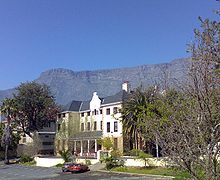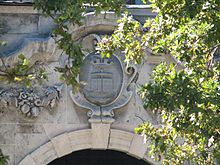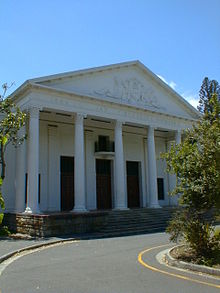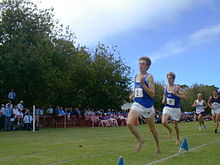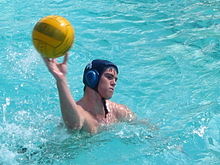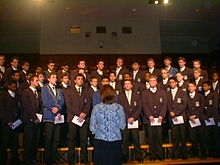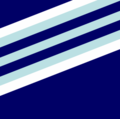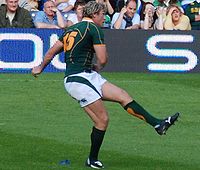- South African College Schools
-
South African College Schools 
SACS Badge Let us be judged by our deedsAddress Newlands Avenue (High School)
Dean Street (Junior School)
Newlands, Cape Town, Western Cape, 7700, South AfricaInformation Founded 1 October 1829 Headmaster Ken Ball (High School)
François Nel (Junior School)Grades 1-12 Enrollment 750 (High School)
650 (Junior School)Language English (primary) Houses Baxter (High School)
Rosedale
Russel
Shaw
Hofmeyer (Junior School)
Kipps
Lewis
van HoldtSchool Colour(s) Song The S.A.C. Accreditation(s) Senior Certificate, GCE A-levels Tuition R 26 000 (High School)
R 26 000 (Junior School)Website http://www.sacollege.org.za The South African College Schools, commonly referred to as SACS, is a primary and secondary education institution located in Newlands, Cape Town, South Africa. Founded in 1829,[1] it is the oldest school in South Africa and one of four schools expressly named by Cecil John Rhodes to offer an annual Rhodes Scholarship to one of its graduating students.[2] The schools are a combination of the South African College Junior School and the South African College High School.
Contents
History
The concept of the South African College was first formed in 1791 when the Dutch Commissioner-General, Jacob Abraham Uitenhage de Mist, asked for funding to be set aside to improve schooling in the Cape. After the British took over control of the Cape Colony its first governor, Lord Charles Henry Somerset PC, gave permission for the funds reserved by de Mist to be used to establish the South African College in 1814.
The founding committee met in the Groote Kerk to discuss funding and accommodation for the school and on October 1, 1829, the inauguration of the South African College was held and classes began. The original location of the school was in the Weeshuis on Long Street and moved to what is now known as the Egyptian Building in the Gardens district of Cape Town in 1841.
It was decided in 1874 that the younger students should be separated from their older counterparts. The South African College was separated into the College which became the University of Cape Town and the College School.[3]
The College School moved to its own building on Orange Street, separate from the College, in 1896. For the next few decades, the school grew and the building became too small for the number of students attending.
In 1959 the school moved to its current home in the Montebello Estate in Newlands,[4] former home of the mining magnate Sir Max Michaelis, after a decade-long negotiation with the Cape Administration.
Coordinates: 33°58′13.45″S 18°27′36.38″E / 33.9704028°S 18.4601056°E
School buildings
The current school buildings are situated along Dean Street and Newlands Avenue in Cape Town.
The Junior School is located along Dean Street and is equipped with numerous fields for sporting activities, of which some are shared with the High School. The Junior School has a full length swimming pool with a smaller children's pool for the younger students. A number of tennis courts are also available to the students. The Junior School has a new Media Center which hosts computer facilities, a new library and classrooms. The music department also has its own auditorium for cultural events and is also used for events with smaller audiences. The Junior School's boarding house is named after J E De Villiers.
The High School is closest to Newlands Avenue which also hosts a number of sport fields for the various sports which the school offers throughout the year. The swimming pool is mainly used for Water Polo and is also heated to facilitate training and usage in winter. The High School also recently had a new Media Centre constructed with air-conditioned computer labs and library. The school hall is named after one of its most famous students, Jan Hendrik Hofmeyr. The boarding houses for the High School are the Michaelis House (for the junior students) and Rosedale House (for the senior students).
Sporting Activities [5][6] Junior School High School Cricket 
Rugby 
Athletics 
Cross-country Hockey (field) 
Squash Tennis 
Water polo 
Fencing 
Basketball 
Judo 
Rowing 
Rock climbing Shooting 
Table Tennis 
Golf 
Sporting activities
The students in both Junior and High Schools are divided into four houses, different in both divisions of the school. In both instances there are annual inter-house sporting events, as well as cultural activities. The events range from cross country and lacrosse to cricket and rugby.
The students take part in sporting competitions with schools from the area, Western Cape and sometimes from other parts of South Africa, as well as occasional competitions with visiting teams from other countries.
A prestigious annual competition for both the High School and the Junior School, named the Triangular, is a chance for the students of three prominent schools in the province to compete against each other on the track and field. The other two schools are Bishops and Rondebosch Boys' High School. The first meeting took place in 1935 and it has rotated between the three schools every year since.
The High School also plays host to various schools around the country in an annual water polo tournament during the September holidays. The visiting schools range from the traditional rivals from the area such as Rondebosch Boys' High School and Bishops, to other institutions such as Durban High School and Kearsney College.
Extramural Activities [5][7] Junior School High School Art Club Choir
Madrigal Ensemble
Junior and Senior ChoirsChess Cubs Band
Jazz and ConcertDrama Enviro Club Computer General Knowledge Photography Climbing First Aid Social Committee History Society Committee Music Society Committee School Magazine SACSnews Multimedia Society Interact Debate Christian Union Muslim Students Association Wine Club Cultural activities
Both the Junior and High Schools have active Music Departments. The High School choir often performs in the Cape Town City Hall with other schools such as Rondebosch Boys' High School and Rustenburg Girls' High School in collaborations of such works as Carl Orff's Carmina Burana in 2001 (conducted by Dr. Barry Smith). The choirs and bands of both divisions of the school competes in the Cape Town Eisteddfod every year at both group and individual events. The High School has two annual bursary competitions, the Christopher Brown and the Walter Swanson Competitions. These are designed to both give an evening of music from the highest standards as well as to encourage the music students to excel in whichever disciplines they take part.
The High School drama department stages annual dramatic productions as well as annual inter-house play competitions. Some recent notable performances are Guys and Dolls in 2000, Fame - The Musical in 2003 and Little Shop of Horrors in 2005.
Every year the school celebrates the founding of the school on Commemoration Day around September 20 (depending on which day it is every year). The High School trains a select group of volunteer students for the parade as well as a handful of centuries for the ceremony. The majority of the group take part as cadets for the parade and march from the Memorial Fields to the Major Quadrangle. The music department trains its students for the marching band. The Head Boy and a notable Old Boy of the school would then lay laurel wreaths at the plaques which commemorate those Old Boys who died fighting in World War I, World War II and the Korean and Border conflicts.
Uniform
The traditional school colour of navy blue was determined in the 1880s when SACS pupils purchased the only pattern available of alternating white, light- and dark-blue horizontal stripes from Porter Hodgson's Outfitters in Cape Town. Prior to this, the pupils wore what they could afford while still being presentable.[8]
High school
The current uniform of the High School has been in place since the 1930s. Pupils from Grades 10 - 12 who excel is Academics, Cultural Acitivites or Sports may be awarded School Colours.
Summer Winter Boater Standard Blazer Navy blue/Light blue (colours awards) Tie See below Shirt White short sleeve White long sleeve Trousers Khaki shorts Charcoal long Socks Brown knee high Black standard Shoes Light brown Black School Colours Awards
The awards are conferred upon pupils by the Headmaster at the end of every school term at the end-of-term assembly (depending on award type).
The Cultural Awards Committee, consisting of senior staff members (typically Heads of Departments) and two Grade 12 students, meet before the end of every term to nominate and vote for potential award candidates. Student representatives are nominated and selected by the senior staff members on the committee, and serve for one year.
The selection process for Academic and Sporting awards vary slightly to the process of Cultural Awards.
Type Additional attire Scroll Scroll to be sewn or ironed-on below the school badge pocket Half Blues New Navy blue blazer pocket with half laurel in silver thread around the school badge Full Blues† New Navy blue blazer pocket with full laurel in silver thread around the school badge New light blue blazer with full laurel in silver thread around the school badge Prefect§ New Navy blue blazer pocket with full laurel in silver metallic thread around the school badge New Prefect tie †Two options §Not colours awards
Tie patterns
‡Non-repeating pattern
The S.A.C. (School Song)
The school song was written by Rev. Dr. F. C. Kolbe with music composed by Sir Meiring Beck and first publicly performed in December 1887. The original school song had three sections but only the first section is currently used. The S.A.C. is well-known to all Old Boys as well as those students who attend the University of Cape Town since they share this as their school song. In the High School, The S.A.C. is sung at the first and last assemblies of the school term as well as other special occasions such as Valedictory Service and the annual Academic Prize Giving events.
- The S.A.C.
- Is the College for me,
- The best in the country round;
- Wherever you go
- The records will show,
- Our equal has never been found!
- For study or play, it is always the same
- Wherever we be,
- We spread the name, and we swell the fame
- Of the S.A.C.[9]
SACS War Cry
The war cry is performed by pupils and Old Boys (Alumni) alike at various occasions such as sporting events or the final assembly of the year.
- Kaaaa...
- Boomaluka, Boomaluka, wha, wha, wha
- Chilalaka, Chilalaka, cha, cha, cha
- Bommaluka, Chilalaka, who are we?
- We are, we are the S.A.C.
- School, School, School
- Yeah SACS, yeah SACS, yeah SACS
- Vat hom, vat hom, vat hom, Yeah! [10]
Rhodes Scholarship
When Cecil John Rhodes died in 1902, he specifically named the South African College in his will as one of four schools in the Cape Colony where the Rhodes Scholarship would be awarded on an annual basis for a former student to study at the University of Oxford.[11]
Old Boys' Union
The SACS Old Boys' Union (OBU) is the oldest Old Boy (Alumni) group in the country. John Ince (1936–2010) — a notable Old Boy who was previously the Headmaster at Camps Bay High School, teacher at the High School, and Guidance Counsellor at the Junior School — served as Executive Director of the OBU until recently.
Notable Old Boys
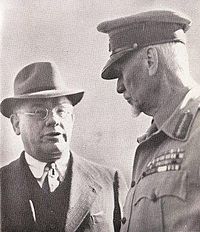 Jan Hendrik Hofmeyr and former Prime Minister of South Africa, Jan Smuts
Jan Hendrik Hofmeyr and former Prime Minister of South Africa, Jan Smuts
- Jan Hendrik Hofmeyr — former Deputy Prime Minister of South Africa, Minister of Finance and Education, Administrator of the Transvaal and Rhodes Scholar
- Leonard Hoffmann, Baron Hoffmann PC — former senior British justice
- Solly Zuckerman, Baron Zuckerman OM, KCB, FRS — British zoologist, public servant and key World War II Allied strategic advisor
- Albie Sachs — former justice of the Constitutional Court of South Africa [12]
- Nicolaas Petrus van Wyk Louw — Afrikaans-language poet, playwright, and scholar
- William Ewart Gladstone van Wyk Louw — Afrikaans-language poet
- Percival Colin "Percy" Montgomery — former South African rugby union footballer and 2007 Rugby World Cup winner
- Peter Kirsten — former South African cricketer
- Stephen Simpson — race car driver and former A1 Grand Prix Team South Africa driver
- Ross Skeate — rugby union footballer for RC Toulon and formerly for Stormers and Western Province rugby union teams
- Eric Lloyd Williams — journalist and World War II correspondent
- Dr. Cecil Moss — former South African rugby union footballer
- Guy Abercrombie Elliott OBE — professor of Medicine at University of the Witwatersrand
- John Ince — educator, former president of the South African Teachers' Association and Headmaster of Camps Bay High School, Cape Town [13]
- Solly Kessler — statesman and anti-Semitism legal expert [14]
- Martin Singer — professor and Head of Hand Surgery, Groote Schuur Hospital and University of Cape Town
- J.E.J Krige — professor of Surgery and Head of Surgical Gastroenterology, Groote Schuur Hospital and University of Cape Town
- Ronald Singer — archeologist
- Peter Jander — artist
- Dylan Lewis — sculptor
- Captain Andrew (Anthony) Frederick Weatherby Beauchamp-Proctor, VC, DSO, MC and bar, DFC
References
- ^ Everhardus Cornelis Gode Molsbergen (2009). A History of South Africa for Use in Schools. BiblioBazaar, LLC, 2009. p. 186.
- ^ Rhodes, Cecil John. "Will and Condicils of the Rt Hon. Cecil John Rhodes." (PDF). Rhodes Trust, University Press Oxford. p. 10. http://www.rhodeshouse.ox.ac.uk/files/governancedocs/WillandCodicils.pdf.
- ^ Standard encyclopaedia of Southern Africa, Volume 10. NASOU. 1976. p. 96.
- ^ Honikman, A. H. (1966). Cape Town, city of good hope. H. B. Timmins. p. 63.
- ^ a b "Sport - South African College Junior School". http://www.sacsjunior.org.za/extramural/sport/.
- ^ "South African College - Senior School (Sport)". http://www.sacollege.org.za/highschoolpros/sport.htm.
- ^ "South African College - Senior School (Cultural)". http://www.sacollege.org.za/highschoolpros/cultural.htm.
- ^ van der Fort, Fouzia (11 May 2005). "School uniforms - what purpose do they serve?". http://www.capeargus.co.za/index.php?fSectionId=342&fArticleId=2516444.
- ^ SACS Old Boys' Union (2009). "SACS School Song". http://www.sacsobu.org/songwarcry.html.
- ^ SACS Old Boys' Union (2009). "SACS War Cry". http://www.sacsobu.org/songwarcry.html.
- ^ Nuttall, Tim (3 January 2009). "Rhodes Scholarships in Southern Africa". http://www.rhodestrust.org.za/about.html.
- ^ Sachs, Albie (1992). Advancing human rights in South Africa. Oxford University Press. p. iii.
- ^ Belling, Suzanne (December 2005). "Obituary: Solly Kessler". http://www.sacsobu.org/memoriam05.html#5.
- ^ Barron, Chris (2010-10-17). "Obituary : John Ince: Legendary headmaster". http://www.timeslive.co.za/sundaytimes/article710885.ece/Obituary---John-Ince--Legendary-headmaster.
Further reading
Veitch, Neil (2003). SACS 175 - A Celebration. Cape Town: SACS 175 Book Committee. pp. 260.
External links
Categories:- Boarding schools in South Africa
- Schools in Cape Town
- Educational institutions established in 1829
Wikimedia Foundation. 2010.

